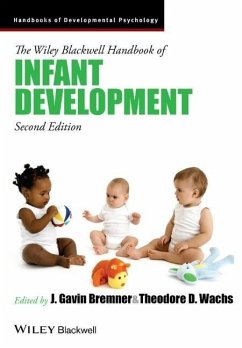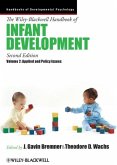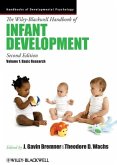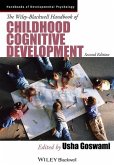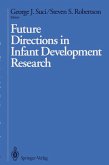The Wiley-Blackwell Handbook of Infant Development, 2 Volume Set
Herausgegeben von Bremner, J. Gavin; Wachs, Theodore D.
The Wiley-Blackwell Handbook of Infant Development, 2 Volume Set
Herausgegeben von Bremner, J. Gavin; Wachs, Theodore D.
- Broschiertes Buch
- Merkliste
- Auf die Merkliste
- Bewerten Bewerten
- Teilen
- Produkt teilen
- Produkterinnerung
- Produkterinnerung
Now presented in two volumes, the second edition of The Wiley-Blackwell Handbook of Infant Development reflects the breadth of new topics and vast empirical knowledge relating to infancy research that has emerged in recent years. Updated and fully-revised, the handbook provides coverage of all the major areas of interest in infant development relating to both psychological research and applications and policy. Individual chapters across both volumes are written by leading international researchers and practitioners in the field - and provide the most up-to-date theoretical underpinnings and…mehr
Andere Kunden interessierten sich auch für
![The Wiley-Blackwell Handbook of Infant Development, Volume 2 The Wiley-Blackwell Handbook of Infant Development, Volume 2]() The Wiley-Blackwell Handbook of Infant Development, Volume 2251,99 €
The Wiley-Blackwell Handbook of Infant Development, Volume 2251,99 €![The Wiley-Blackwell Handbook of Infant Development, Volume 1: Basic Research The Wiley-Blackwell Handbook of Infant Development, Volume 1: Basic Research]() The Wiley-Blackwell Handbook of Infant Development, Volume 1: Basic Research253,99 €
The Wiley-Blackwell Handbook of Infant Development, Volume 1: Basic Research253,99 €![The Wiley-Blackwell Handbook of Childhood Cognitive Development The Wiley-Blackwell Handbook of Childhood Cognitive Development]() The Wiley-Blackwell Handbook of Childhood Cognitive Development66,99 €
The Wiley-Blackwell Handbook of Childhood Cognitive Development66,99 €![The Encyclopedia of Child and Adolescent Development, 10 Volume Set The Encyclopedia of Child and Adolescent Development, 10 Volume Set]() The Encyclopedia of Child and Adolescent Development, 10 Volume Set2.166,99 €
The Encyclopedia of Child and Adolescent Development, 10 Volume Set2.166,99 €![The Wiley Handbook of Group Processes in Children and Adolescents The Wiley Handbook of Group Processes in Children and Adolescents]() The Wiley Handbook of Group Processes in Children and Adolescents238,99 €
The Wiley Handbook of Group Processes in Children and Adolescents238,99 €![The Wiley Blackwell Handbook of Bullying, 2 Volume Set The Wiley Blackwell Handbook of Bullying, 2 Volume Set]() The Wiley Blackwell Handbook of Bullying, 2 Volume Set377,99 €
The Wiley Blackwell Handbook of Bullying, 2 Volume Set377,99 €![Future Directions in Infant Development Research Future Directions in Infant Development Research]() Future Directions in Infant Development Research125,99 €
Future Directions in Infant Development Research125,99 €-
-
-
Now presented in two volumes, the second edition of The Wiley-Blackwell Handbook of Infant Development reflects the breadth of new topics and vast empirical knowledge relating to infancy research that has emerged in recent years. Updated and fully-revised, the handbook provides coverage of all the major areas of interest in infant development relating to both psychological research and applications and policy. Individual chapters across both volumes are written by leading international researchers and practitioners in the field - and provide the most up-to-date theoretical underpinnings and empirical results of the field.
Now in two volumes, the fully revised and updated second edition of The Wiley- Blackwell Handbook of Infant Development provides comprehensive coverage of the basic research and appliedand policy issues relating to infant development
Updated, fully-revised and expanded, this two-volume setpresents in-depth and cutting edge coverage of both basic andapplied developmental issues during infancy
Features contributions by leading international researchersand practitioners in the field that reflect the most currenttheories and research findings
Includes editor commentary and analysis to synthesize thematerial and provide further insight
The most comprehensive work available in this dynamic andrapidly growing field
The hardcover version of this book is printed in two volumes.The paperback version offers the content of Volume I and Volume IIcombined into a single book.
Hinweis: Dieser Artikel kann nur an eine deutsche Lieferadresse ausgeliefert werden.
Now in two volumes, the fully revised and updated second edition of The Wiley- Blackwell Handbook of Infant Development provides comprehensive coverage of the basic research and appliedand policy issues relating to infant development
Updated, fully-revised and expanded, this two-volume setpresents in-depth and cutting edge coverage of both basic andapplied developmental issues during infancy
Features contributions by leading international researchersand practitioners in the field that reflect the most currenttheories and research findings
Includes editor commentary and analysis to synthesize thematerial and provide further insight
The most comprehensive work available in this dynamic andrapidly growing field
The hardcover version of this book is printed in two volumes.The paperback version offers the content of Volume I and Volume IIcombined into a single book.
Hinweis: Dieser Artikel kann nur an eine deutsche Lieferadresse ausgeliefert werden.
Produktdetails
- Produktdetails
- Blackwell Handbooks of Developmental Psychology .1
- Verlag: Wiley & Sons
- Artikelnr. des Verlages: 1A118672860
- 2. Aufl.
- Seitenzahl: 1170
- Erscheinungstermin: 28. Januar 2014
- Englisch
- Abmessung: 246mm x 174mm x 55mm
- Gewicht: 1750g
- ISBN-13: 9781118672860
- ISBN-10: 1118672860
- Artikelnr.: 38106823
- Herstellerkennzeichnung
- Libri GmbH
- Europaallee 1
- 36244 Bad Hersfeld
- gpsr@libri.de
- Blackwell Handbooks of Developmental Psychology .1
- Verlag: Wiley & Sons
- Artikelnr. des Verlages: 1A118672860
- 2. Aufl.
- Seitenzahl: 1170
- Erscheinungstermin: 28. Januar 2014
- Englisch
- Abmessung: 246mm x 174mm x 55mm
- Gewicht: 1750g
- ISBN-13: 9781118672860
- ISBN-10: 1118672860
- Artikelnr.: 38106823
- Herstellerkennzeichnung
- Libri GmbH
- Europaallee 1
- 36244 Bad Hersfeld
- gpsr@libri.de
Gavin Bremner is Professor of Developmental Psychology at Lancaster University. He has investigated perception and cognition in infancy for more than 30 years, and has published numerous papers and books relating to this topic. His current research interests include infants' perception of object trajectories and infants' intersensory perception. Theodore D. Wachs is Professor of Psychological Sciences at Purdue University. He is a member of the editorial boards of the International Journal of Behavioral Development and the Journal of Applied Developmental Psychology. His current research focuses on chaotic family environments and infant development; micro-nutrient deficiencies in infancy and cognitive and social-emotional development; and temperament in infancy and childhood.
Preface (Gavin Bremner and Theodore D. Wachs). VOLUME I: BASIC RESEARCH. Chapter 1: Historical Reflections on Intimacy (Alan Fogel
University of Utah). Part I: Basic perceptual and cognitive development. Chapter 2: Visual perception (Alan Slater
Washington Singer Laboratories
Patricia Riddell
University of Reading
Paul C. Quinn
University of Delaware
Olivier Pascalis
University of Sheffield
Kang Lee
University of Toronto
and David J. Kelly
University of Glasgow). Chapter 3: Auditory Development (Denis Burnham
University of Western Sydney
and Karen Mattock
Lancaster University). Chapter 4: Intermodal Perception and Selective Attention to Intersensory Redundancy: Implications for Typical Social Development and Autism ( Lorraine E. Bahrick
Florida International University). Chapter 5: Action in Infancy - Perspectives
Concepts
and Challenges (Ad Smitsman
Radboud University
and Daniela Corbetta
University of Tennessee ). Chapter 6: Cognitive Development: Knowledge of the physical world (Gavin Bremner
Lancaster University). Chapter 7: Perceptual categorisation and concepts (David H. Rakison
Carnegie Mellon University). Chapter 8: Infant learning and memory (Carolyn Rovee-Collier
Rutgers University
and Rachel Barr
Georgetown University). Chapter 9: Functional brain development during infancy (Mark H. Johnson
Birkbeck College
University of London). Part II: Social cognition
communication
and language. Chapter 10: Emerging self-concept (Philippe Rochat
Emory University). Chapter 11: The Importance of Imitation for Theories of Social-Cognitive Development (Andrew N. Meltzoff
University of Washington
and Rebecca A. Williamson
Georgia State University). Chapter 12: Engaging Minds in the first year: The developing awareness of attention and intention (Vasudevi Reddy
Portsmouth University). Chapter 13: Preverbal communication (Andrew Lock
Massey University
and Patricia Zukow-Goldring
University of California
Los Angeles). Chapter 14: Early language (George Hollich
Purdue University). Part III: Social-emotional development. Chapter 15: Parent-infant interaction (Marc H. Bornstein
Eunice Kennedy Shriver National Institute of Child Health and Human Development
and Catherine S. Tamis-LeMonda
New York University). Chapter 16: Attachment in infancy (Germán Posada and Garene Kaloustian
Purdue University). Chapter 17: Early social cognitive skills at play in toddlers' peer interactions (Hildy Ross
University of Waterloo
Marcia Vickar
University of Waterloo
and Michal Perlman
University of Toronto). Chapter 18: Touch and physical contact during infancy: Discovering the richness of the forgotten sense (Dale M. Stack
Concordia University). Chapter 19: Emotion and its development in infancy (David C. Witherington
University of New Mexico
Joseph J. Campos
University of California
Berkeley
Jennifer A. Harriger
Cheryl Bryan
& Tessa E. Margett
University of New Mexico). Chapter 20: Temperament (Theodore D. Wachs
Purdue University
and John E. Bates
Indiana University Bloomington). Chapter 21: Culture and infancy (Charles M. Super and Sara Harkness
University of Connecticut). VOLUME II: APPLIED AND POLICY ISSUES. Part I: Bioecological risks. Chapter 1: Fetal development (Raye-Ann deRegnier and Shivani Desai
Northwestern University Feinberg School of Medicine). Chapter 2: Infant nutrition (Maureen M. Black and Kristen M. Hurley
University of Maryland School of Medicine). Chapter 3: Health (Robert J. Karp
SUNY-Downstate Medical Center). Chapter 4: Development of communication in children with sensory functional disabilities (Gunilla Preisler
University of Stockholm). Part II: Psychosocial risks. Chapter 5: Growing up in poverty in developed countries (Jondou J. Chen
Nina Philipsen Hetzner
and Jeanne Brooks-Gunn
Columbia University). Chapter 6: Infant Development in the Developing World (Patrice Engle
California Polytechnic State University). Chapter 7: Child abuse and neglect (Kelli Connell-Carrick
University of Houston). Chapter 8: Effects of postnatal depression on mother-infant interactions
and child development (Lynne Murray
Sarah Halligan and Peter Cooper
University of Reading). Part III: Developmental disorders. Chapter 9: Infant assessment (Susan P. Berger
Children's Memorial Hospital & Northwestern University
Feinberg School of Medicine
Joyce Hopkins
Illinois Institute of Technology
Hyo Bae
Illinois Institute of Technology
Bryce Hella
Illinois Institute of Technology
and Jennifer Strickland
Illinois Institute of Technology). Chapter 10: The Early Development of Autism Spectrum Disorders (Gregory S. Young and Sally Ozonoff
University of California
Davis). Chapter 11: Infant Psychosocial Disorders (Melissa R. Johnson
WakeMed Health and Hospitals & University of North Carolina - Chapel Hill
Karen Appleyard
Duke University). Chapter 12: Genetic Disorders Associated with Intellectual Disability: An Early Development Perspective (Deborah J. Fidler
Colorado State University
Lisa Daunhauer
Colorado State University
David E. Most
Colorado State University
and Harvey Switzky
Northern Illinois University ). Part IV: Intervention and policy issues. Chapter 13: Early intervention (Douglas R. Powell
Purdue University). Chapter 14: Childcare Research at the Dawn of a New Millennium: An update ( Sarah L. Friedman
CNA
Edward Melhuish
Birkbeck
University of London
and Candace Hill
CNA). Chapter 15: Infancy research
policy
and practice (Marguerite Barratt and Erica Fener
The George Washington University).
University of Utah). Part I: Basic perceptual and cognitive development. Chapter 2: Visual perception (Alan Slater
Washington Singer Laboratories
Patricia Riddell
University of Reading
Paul C. Quinn
University of Delaware
Olivier Pascalis
University of Sheffield
Kang Lee
University of Toronto
and David J. Kelly
University of Glasgow). Chapter 3: Auditory Development (Denis Burnham
University of Western Sydney
and Karen Mattock
Lancaster University). Chapter 4: Intermodal Perception and Selective Attention to Intersensory Redundancy: Implications for Typical Social Development and Autism ( Lorraine E. Bahrick
Florida International University). Chapter 5: Action in Infancy - Perspectives
Concepts
and Challenges (Ad Smitsman
Radboud University
and Daniela Corbetta
University of Tennessee ). Chapter 6: Cognitive Development: Knowledge of the physical world (Gavin Bremner
Lancaster University). Chapter 7: Perceptual categorisation and concepts (David H. Rakison
Carnegie Mellon University). Chapter 8: Infant learning and memory (Carolyn Rovee-Collier
Rutgers University
and Rachel Barr
Georgetown University). Chapter 9: Functional brain development during infancy (Mark H. Johnson
Birkbeck College
University of London). Part II: Social cognition
communication
and language. Chapter 10: Emerging self-concept (Philippe Rochat
Emory University). Chapter 11: The Importance of Imitation for Theories of Social-Cognitive Development (Andrew N. Meltzoff
University of Washington
and Rebecca A. Williamson
Georgia State University). Chapter 12: Engaging Minds in the first year: The developing awareness of attention and intention (Vasudevi Reddy
Portsmouth University). Chapter 13: Preverbal communication (Andrew Lock
Massey University
and Patricia Zukow-Goldring
University of California
Los Angeles). Chapter 14: Early language (George Hollich
Purdue University). Part III: Social-emotional development. Chapter 15: Parent-infant interaction (Marc H. Bornstein
Eunice Kennedy Shriver National Institute of Child Health and Human Development
and Catherine S. Tamis-LeMonda
New York University). Chapter 16: Attachment in infancy (Germán Posada and Garene Kaloustian
Purdue University). Chapter 17: Early social cognitive skills at play in toddlers' peer interactions (Hildy Ross
University of Waterloo
Marcia Vickar
University of Waterloo
and Michal Perlman
University of Toronto). Chapter 18: Touch and physical contact during infancy: Discovering the richness of the forgotten sense (Dale M. Stack
Concordia University). Chapter 19: Emotion and its development in infancy (David C. Witherington
University of New Mexico
Joseph J. Campos
University of California
Berkeley
Jennifer A. Harriger
Cheryl Bryan
& Tessa E. Margett
University of New Mexico). Chapter 20: Temperament (Theodore D. Wachs
Purdue University
and John E. Bates
Indiana University Bloomington). Chapter 21: Culture and infancy (Charles M. Super and Sara Harkness
University of Connecticut). VOLUME II: APPLIED AND POLICY ISSUES. Part I: Bioecological risks. Chapter 1: Fetal development (Raye-Ann deRegnier and Shivani Desai
Northwestern University Feinberg School of Medicine). Chapter 2: Infant nutrition (Maureen M. Black and Kristen M. Hurley
University of Maryland School of Medicine). Chapter 3: Health (Robert J. Karp
SUNY-Downstate Medical Center). Chapter 4: Development of communication in children with sensory functional disabilities (Gunilla Preisler
University of Stockholm). Part II: Psychosocial risks. Chapter 5: Growing up in poverty in developed countries (Jondou J. Chen
Nina Philipsen Hetzner
and Jeanne Brooks-Gunn
Columbia University). Chapter 6: Infant Development in the Developing World (Patrice Engle
California Polytechnic State University). Chapter 7: Child abuse and neglect (Kelli Connell-Carrick
University of Houston). Chapter 8: Effects of postnatal depression on mother-infant interactions
and child development (Lynne Murray
Sarah Halligan and Peter Cooper
University of Reading). Part III: Developmental disorders. Chapter 9: Infant assessment (Susan P. Berger
Children's Memorial Hospital & Northwestern University
Feinberg School of Medicine
Joyce Hopkins
Illinois Institute of Technology
Hyo Bae
Illinois Institute of Technology
Bryce Hella
Illinois Institute of Technology
and Jennifer Strickland
Illinois Institute of Technology). Chapter 10: The Early Development of Autism Spectrum Disorders (Gregory S. Young and Sally Ozonoff
University of California
Davis). Chapter 11: Infant Psychosocial Disorders (Melissa R. Johnson
WakeMed Health and Hospitals & University of North Carolina - Chapel Hill
Karen Appleyard
Duke University). Chapter 12: Genetic Disorders Associated with Intellectual Disability: An Early Development Perspective (Deborah J. Fidler
Colorado State University
Lisa Daunhauer
Colorado State University
David E. Most
Colorado State University
and Harvey Switzky
Northern Illinois University ). Part IV: Intervention and policy issues. Chapter 13: Early intervention (Douglas R. Powell
Purdue University). Chapter 14: Childcare Research at the Dawn of a New Millennium: An update ( Sarah L. Friedman
CNA
Edward Melhuish
Birkbeck
University of London
and Candace Hill
CNA). Chapter 15: Infancy research
policy
and practice (Marguerite Barratt and Erica Fener
The George Washington University).
Preface (Gavin Bremner and Theodore D. Wachs). VOLUME I: BASIC RESEARCH. Chapter 1: Historical Reflections on Intimacy (Alan Fogel
University of Utah). Part I: Basic perceptual and cognitive development. Chapter 2: Visual perception (Alan Slater
Washington Singer Laboratories
Patricia Riddell
University of Reading
Paul C. Quinn
University of Delaware
Olivier Pascalis
University of Sheffield
Kang Lee
University of Toronto
and David J. Kelly
University of Glasgow). Chapter 3: Auditory Development (Denis Burnham
University of Western Sydney
and Karen Mattock
Lancaster University). Chapter 4: Intermodal Perception and Selective Attention to Intersensory Redundancy: Implications for Typical Social Development and Autism ( Lorraine E. Bahrick
Florida International University). Chapter 5: Action in Infancy - Perspectives
Concepts
and Challenges (Ad Smitsman
Radboud University
and Daniela Corbetta
University of Tennessee ). Chapter 6: Cognitive Development: Knowledge of the physical world (Gavin Bremner
Lancaster University). Chapter 7: Perceptual categorisation and concepts (David H. Rakison
Carnegie Mellon University). Chapter 8: Infant learning and memory (Carolyn Rovee-Collier
Rutgers University
and Rachel Barr
Georgetown University). Chapter 9: Functional brain development during infancy (Mark H. Johnson
Birkbeck College
University of London). Part II: Social cognition
communication
and language. Chapter 10: Emerging self-concept (Philippe Rochat
Emory University). Chapter 11: The Importance of Imitation for Theories of Social-Cognitive Development (Andrew N. Meltzoff
University of Washington
and Rebecca A. Williamson
Georgia State University). Chapter 12: Engaging Minds in the first year: The developing awareness of attention and intention (Vasudevi Reddy
Portsmouth University). Chapter 13: Preverbal communication (Andrew Lock
Massey University
and Patricia Zukow-Goldring
University of California
Los Angeles). Chapter 14: Early language (George Hollich
Purdue University). Part III: Social-emotional development. Chapter 15: Parent-infant interaction (Marc H. Bornstein
Eunice Kennedy Shriver National Institute of Child Health and Human Development
and Catherine S. Tamis-LeMonda
New York University). Chapter 16: Attachment in infancy (Germán Posada and Garene Kaloustian
Purdue University). Chapter 17: Early social cognitive skills at play in toddlers' peer interactions (Hildy Ross
University of Waterloo
Marcia Vickar
University of Waterloo
and Michal Perlman
University of Toronto). Chapter 18: Touch and physical contact during infancy: Discovering the richness of the forgotten sense (Dale M. Stack
Concordia University). Chapter 19: Emotion and its development in infancy (David C. Witherington
University of New Mexico
Joseph J. Campos
University of California
Berkeley
Jennifer A. Harriger
Cheryl Bryan
& Tessa E. Margett
University of New Mexico). Chapter 20: Temperament (Theodore D. Wachs
Purdue University
and John E. Bates
Indiana University Bloomington). Chapter 21: Culture and infancy (Charles M. Super and Sara Harkness
University of Connecticut). VOLUME II: APPLIED AND POLICY ISSUES. Part I: Bioecological risks. Chapter 1: Fetal development (Raye-Ann deRegnier and Shivani Desai
Northwestern University Feinberg School of Medicine). Chapter 2: Infant nutrition (Maureen M. Black and Kristen M. Hurley
University of Maryland School of Medicine). Chapter 3: Health (Robert J. Karp
SUNY-Downstate Medical Center). Chapter 4: Development of communication in children with sensory functional disabilities (Gunilla Preisler
University of Stockholm). Part II: Psychosocial risks. Chapter 5: Growing up in poverty in developed countries (Jondou J. Chen
Nina Philipsen Hetzner
and Jeanne Brooks-Gunn
Columbia University). Chapter 6: Infant Development in the Developing World (Patrice Engle
California Polytechnic State University). Chapter 7: Child abuse and neglect (Kelli Connell-Carrick
University of Houston). Chapter 8: Effects of postnatal depression on mother-infant interactions
and child development (Lynne Murray
Sarah Halligan and Peter Cooper
University of Reading). Part III: Developmental disorders. Chapter 9: Infant assessment (Susan P. Berger
Children's Memorial Hospital & Northwestern University
Feinberg School of Medicine
Joyce Hopkins
Illinois Institute of Technology
Hyo Bae
Illinois Institute of Technology
Bryce Hella
Illinois Institute of Technology
and Jennifer Strickland
Illinois Institute of Technology). Chapter 10: The Early Development of Autism Spectrum Disorders (Gregory S. Young and Sally Ozonoff
University of California
Davis). Chapter 11: Infant Psychosocial Disorders (Melissa R. Johnson
WakeMed Health and Hospitals & University of North Carolina - Chapel Hill
Karen Appleyard
Duke University). Chapter 12: Genetic Disorders Associated with Intellectual Disability: An Early Development Perspective (Deborah J. Fidler
Colorado State University
Lisa Daunhauer
Colorado State University
David E. Most
Colorado State University
and Harvey Switzky
Northern Illinois University ). Part IV: Intervention and policy issues. Chapter 13: Early intervention (Douglas R. Powell
Purdue University). Chapter 14: Childcare Research at the Dawn of a New Millennium: An update ( Sarah L. Friedman
CNA
Edward Melhuish
Birkbeck
University of London
and Candace Hill
CNA). Chapter 15: Infancy research
policy
and practice (Marguerite Barratt and Erica Fener
The George Washington University).
University of Utah). Part I: Basic perceptual and cognitive development. Chapter 2: Visual perception (Alan Slater
Washington Singer Laboratories
Patricia Riddell
University of Reading
Paul C. Quinn
University of Delaware
Olivier Pascalis
University of Sheffield
Kang Lee
University of Toronto
and David J. Kelly
University of Glasgow). Chapter 3: Auditory Development (Denis Burnham
University of Western Sydney
and Karen Mattock
Lancaster University). Chapter 4: Intermodal Perception and Selective Attention to Intersensory Redundancy: Implications for Typical Social Development and Autism ( Lorraine E. Bahrick
Florida International University). Chapter 5: Action in Infancy - Perspectives
Concepts
and Challenges (Ad Smitsman
Radboud University
and Daniela Corbetta
University of Tennessee ). Chapter 6: Cognitive Development: Knowledge of the physical world (Gavin Bremner
Lancaster University). Chapter 7: Perceptual categorisation and concepts (David H. Rakison
Carnegie Mellon University). Chapter 8: Infant learning and memory (Carolyn Rovee-Collier
Rutgers University
and Rachel Barr
Georgetown University). Chapter 9: Functional brain development during infancy (Mark H. Johnson
Birkbeck College
University of London). Part II: Social cognition
communication
and language. Chapter 10: Emerging self-concept (Philippe Rochat
Emory University). Chapter 11: The Importance of Imitation for Theories of Social-Cognitive Development (Andrew N. Meltzoff
University of Washington
and Rebecca A. Williamson
Georgia State University). Chapter 12: Engaging Minds in the first year: The developing awareness of attention and intention (Vasudevi Reddy
Portsmouth University). Chapter 13: Preverbal communication (Andrew Lock
Massey University
and Patricia Zukow-Goldring
University of California
Los Angeles). Chapter 14: Early language (George Hollich
Purdue University). Part III: Social-emotional development. Chapter 15: Parent-infant interaction (Marc H. Bornstein
Eunice Kennedy Shriver National Institute of Child Health and Human Development
and Catherine S. Tamis-LeMonda
New York University). Chapter 16: Attachment in infancy (Germán Posada and Garene Kaloustian
Purdue University). Chapter 17: Early social cognitive skills at play in toddlers' peer interactions (Hildy Ross
University of Waterloo
Marcia Vickar
University of Waterloo
and Michal Perlman
University of Toronto). Chapter 18: Touch and physical contact during infancy: Discovering the richness of the forgotten sense (Dale M. Stack
Concordia University). Chapter 19: Emotion and its development in infancy (David C. Witherington
University of New Mexico
Joseph J. Campos
University of California
Berkeley
Jennifer A. Harriger
Cheryl Bryan
& Tessa E. Margett
University of New Mexico). Chapter 20: Temperament (Theodore D. Wachs
Purdue University
and John E. Bates
Indiana University Bloomington). Chapter 21: Culture and infancy (Charles M. Super and Sara Harkness
University of Connecticut). VOLUME II: APPLIED AND POLICY ISSUES. Part I: Bioecological risks. Chapter 1: Fetal development (Raye-Ann deRegnier and Shivani Desai
Northwestern University Feinberg School of Medicine). Chapter 2: Infant nutrition (Maureen M. Black and Kristen M. Hurley
University of Maryland School of Medicine). Chapter 3: Health (Robert J. Karp
SUNY-Downstate Medical Center). Chapter 4: Development of communication in children with sensory functional disabilities (Gunilla Preisler
University of Stockholm). Part II: Psychosocial risks. Chapter 5: Growing up in poverty in developed countries (Jondou J. Chen
Nina Philipsen Hetzner
and Jeanne Brooks-Gunn
Columbia University). Chapter 6: Infant Development in the Developing World (Patrice Engle
California Polytechnic State University). Chapter 7: Child abuse and neglect (Kelli Connell-Carrick
University of Houston). Chapter 8: Effects of postnatal depression on mother-infant interactions
and child development (Lynne Murray
Sarah Halligan and Peter Cooper
University of Reading). Part III: Developmental disorders. Chapter 9: Infant assessment (Susan P. Berger
Children's Memorial Hospital & Northwestern University
Feinberg School of Medicine
Joyce Hopkins
Illinois Institute of Technology
Hyo Bae
Illinois Institute of Technology
Bryce Hella
Illinois Institute of Technology
and Jennifer Strickland
Illinois Institute of Technology). Chapter 10: The Early Development of Autism Spectrum Disorders (Gregory S. Young and Sally Ozonoff
University of California
Davis). Chapter 11: Infant Psychosocial Disorders (Melissa R. Johnson
WakeMed Health and Hospitals & University of North Carolina - Chapel Hill
Karen Appleyard
Duke University). Chapter 12: Genetic Disorders Associated with Intellectual Disability: An Early Development Perspective (Deborah J. Fidler
Colorado State University
Lisa Daunhauer
Colorado State University
David E. Most
Colorado State University
and Harvey Switzky
Northern Illinois University ). Part IV: Intervention and policy issues. Chapter 13: Early intervention (Douglas R. Powell
Purdue University). Chapter 14: Childcare Research at the Dawn of a New Millennium: An update ( Sarah L. Friedman
CNA
Edward Melhuish
Birkbeck
University of London
and Candace Hill
CNA). Chapter 15: Infancy research
policy
and practice (Marguerite Barratt and Erica Fener
The George Washington University).

